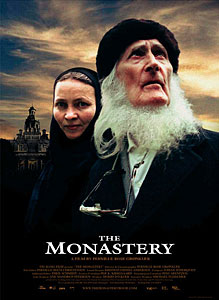Brains and memoriesI'm reading a review in the
New York Review of Books on two prominent neuroscientists, Jean-Pierre Changeux and Gerald M. Edelman, and I find myself quite at a loss of how to understand their ideas about "memory" in relation to the way we actually talk about memories, the roles such talk plays. Israel Rosenfield, the writer of the article, says:
In fact, "external reality" is a construction of the brain. Our senses are confronted by a chaotic, constantly changing world that has no labels, and the brain must make sense of that chaos. It is the brain's correlations of sensory information that create the knowledge we have about our surroundings, such as the sounds of words and music, the images we see in paintings and photographs, the colors we perceive: "perception is not merely a reflection of immediate input," Edelman and Tononi write, "but involves a construction or a comparison by the brain."
The main dispute between Edelman and Changeux seems to concern the issue of whether memories can be understood as neural representations. While Edelman disputes it altogether, Changeux presents a "sophisticated" functional analysis of such representations. Much of their views seem to hinge on "external reality" as a chaotic buzz that our brains, somehow, has to "take in" so that meaning can be created. Music is created out of sounds (sound waves?), and paintings are created out of - images? But, taking this view at face value, even such concepts as "images" or "colors" seems to be far too "meaning-laden" to fit into this picture of a chaotic external world. Because both "color" (as in red, blueish, pig-pink and so on) and images ("from this angle I see...") cannot be separated from meaning (or so it appears to me). If we want to hold on the the view of external reality as chaos, maybe we have better talk about this undefinable, inscrutable
X that, somehow, finds its way into our brains, in which Meaning is created. Mystifying, to say the least.
Here's another formulation of the same idea, this time from an article in
The New Yorker:
The mind integrates scattered, weak, rudimentary signals from a variety of sensory channels, information from past experiences, and hard-wired processes, and produces a sensory experience full of brain-provided color, sound, texture, and meaning. [...] Perception is inference.
The example focused on here is phantom limbs but also some formerly inpenetrable phenomena related to itches that may be explained by this view of the relation between perception, the brain and reality. The idea criticized here - and the criticism is justified, it seems to me - is that perception is something like a sucking in of information from the surrounding world, perception being, thus, impressions, picture-like reproductions of the world (Hume, I think, would have it that way). But now I want to ask: do the alternatives run down to these two: either we simply receive information from the outside world or our brains constantly construct meanings, sounds, colors? And what about the idea of the brain "making inferences" - can it be translated into terms that makes it less prone to have the ring of antropomorphism? (I know too little to come up with an adequate answer, but as it stands, I allow myself to be puzzled.)
Having a brain and being able to remember things are inseparable. But everything depends on what we want to say about memories. Are we talking about alzeimer? Some other neurological disease that can be shown to have an influence on some abilities? Or are we instead talking about the way we suddenly may come to think of Gunnel-my-first-teacher-at-school-whom-I-adored-so-much? Such specifications are very rarely to be found in explorations of the connections between memory and neurological functions.
For example, contrary to our visual experience, there are no colors in the world, only electromagnetic waves of many frequencies. The brain compares the amount of light reflected in the long (red), middle (green), and short (blue) wavelengths, and from these comparisons creates the colors we see.
All right, but what is meant by "the colors we see"? If this description is proposed as an explanation of the meaning color concepts have, then I think it is wrong-headed. If it is to have some other role - well, then I am a bit more at ease with it. And "there are no colors in the world" seems, at least that is how I react, to imply the question: "then, is the WORLD simply something totally independent of human consciousness, but, perhaps, something that science explores?" If so, then - well. At least some words of clarification would have been illuminating. "Do you see how green her face is? I can tell she has a terribly awful hangover." "No her face is white, not green, but I get your point." What makes you see the greenness in her face? The neural circuits in your brain?
And the idea that the brain "compares". The choice of words here is a bit misleading - if we do not buy the idea of some mix between darwinism and neuroscience, a variation of a theory launched by Changeux. (The idea that the brain strives, makes choices, compares, etc., is confused and replete with antropomorphism) But I should not say too much about Changeux - it's foolish to draw too many conclusions on the basis of a review.
Our visual worlds are stabilized because the brain, through color perception, simplifies the environment by comparing the amounts of lightness and darkness in the different frequencies from moment to moment.
"Our wisual worlds"? What does that mean? And "the brain simplifies..." is, in my opinion, just another example of the antropomorphisms I've already talked about. I get the picture of an army of industrious workers residing in my brain, who is sorting out the essential information from inessential info, so that "I" (whatever
that is!) am able to take it all in. Our brains are far less considerate than what many popular ideas labelled "neuroscience" take them to be.
My brain does not see, nor does it feel. That is what
I am doing, not my brain. My brain might be damaged, it may malfunction, but then let's talk about
that. Rizzolatti and Corrado Sinigaglia is quoted in the articles as talking about "the acting brain is also and above all a brain that understands." and from this, a more general conclusion may be drawn:
Our abilities to understand and react to the emotions of others may depend on the brain's ability to imitate the neuronal activity of the individual being observed. When we see a friend crying, we may feel sympathy because the activity in our brain is similar to that in the brain of the person crying. We recognize disgust in another person through our own experience of the feeling of disgust and the associated neural activity.
Well, at this point I don't know what to say anymore. It's too much, it's too outlandish. No matter what can be shown to go on in the brains of human beings when X takes place, this does not mean that brain state X "lies behind" what human beings do in this situation. And I don't even want to start explaining why this picture of "understanding others' emotions" is utterly wrong-headed, boarding on the bizarre (even though this picture has got a lot of currency nowadays).
Subjective dimension of memories?Rosenfield also mentions the "subjective character of memories":
In general, every recollection refers not only to the remembered event or person or object but to the person who is remembering. The very essence of memory is subjective, not mechanical, reproduction; and essential to that subjective psychology is that every remembered image of a person, place, idea, or object inevitably contains, whether explicitly or implicitly, a basic reference to the person who is remembering.
But I'm not so sure that "refers to" will help much. One is easily inclined to imagine that there are two things: the recollection (an image of some sort) and the person it "refers to". But when I suddenly remember your last name, or when I think about our adventures yesterday, or when I resent having got so pissed at the party - it is not some curious "references" that makes these
my memories (or my thoughts). Compare: "Oh god, I don't want to think about this, I wish I was not the person who got drunk at that party." But usually these questions do not arise at all. Furthermore, it would be quite misleading to say that
all memories are images. "You didn't return the books to the library, even though you promised to do it." - Where's the image in that?
But the hope lives on that science will clarify the nature of memories, even the subjective nature of memories:
And as these differing views show, while we are still far from a full understanding of the nature of memory, perception, and meaning, it is nonetheless because of the work of scientists such as Changeux, Edelman, and Rizzolatti that we have a better grasp of the complexity of subjective experiences.An unexpected scientific discovery can give us a new insight into something we thought we had always known: mirror neurons, Rizzolatti tells us, "show how strong and deeply rooted is the bond that ties us to others, or in other words, how bizarre it would be to conceive of an I without an us."
The "complexity" referred to here is, of course, of a purely scientific nature. The many aspects of memory that Proust talks about in
Time regained appear mysterious to the neuroscientist for completely different reasons, which seem to be the connection bewteen 'the chaos of the external world' - mechanical processes of the brain - "subjective aspects of memory".
If you're interested in these things, have a look at David Cockburn's excellent book
Other times (1997), in which he grapples with time, memories and tensed language. His arguments are not always easy to follow, but that is not to be ascribed to a deficiency of his, but to the difficulty of the subject at hand. Criticism is levelled at antropomorphic views of the brain among many of the post-wittgensteinians writing in the field of philosophy of mind.
To quote Bill Callahan (Smog):
Cold-blooded old times
Cold-blooded old times
The type of memories
that turns your bones to glass
Turns your bones to glass
PS: Philosophy of mind is not my main area of interest. I am a mere amateur. A happy and carefree one.













 This is the origins of Gösta.
This is the origins of Gösta.



 This is another day, another pub, another idyllic place. Gösta is introduced to Sture Alléns Dansorkester. Gösta is thrilled. Then there's Johnny Cash in the sound system.
This is another day, another pub, another idyllic place. Gösta is introduced to Sture Alléns Dansorkester. Gösta is thrilled. Then there's Johnny Cash in the sound system.

 This is an even sweeter night.
This is an even sweeter night.  Gösta is the last person on earth. Gösta is waiting for the zombies to dig their teeth into his flesh.
Gösta is the last person on earth. Gösta is waiting for the zombies to dig their teeth into his flesh.







